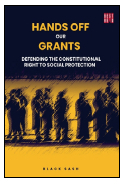Servicios Personalizados
Articulo
Indicadores
Links relacionados
-
 Citado por Google
Citado por Google -
 Similares en Google
Similares en Google
Compartir
South African Journal of Science
versión On-line ISSN 1996-7489
versión impresa ISSN 0038-2353
S. Afr. j. sci. vol.118 no.9-10 Pretoria sep./oct. 2022
http://dx.doi.org/10.17159/sajs.2022/14158
BOOK REVIEW
Financial inclusion gone wrong: Review of Hands Off Our Grants
Gift Dafuleya
Department of Economics, University of Venda, Thohoyandou, South Africa. Email: gift.dafuleya@univen.ac.za

Book Title: Hands off our grants: Defending the constitutional right to social protection
Author: Black Sash
ISBN: 9781928246503 (softcover, 228 pp)
Publisher: HSRC Press, Cape Town, South Africa; ZAR687.70
Published: 2022
At a time when financial inclusion is hailed as one of Africa's great success stories of the past decade1, Black Sash's book Hands Off Our Grants: Defending the Constitutional Right to Social Protection challenges us to think about what exactly we mean by success. It is easy to agree that the inclusion of the previously unbanked into useful financial products and services to meet their needs is an urgent necessity that drives African nations towards achieving Agenda 2063 and the Sustainable Development Goals. However, this needs questioning if it comes with enriching the elite at the expense of the poor.
Black Sash - a 66-year-old human rights civil service organisation advocating for social justice in South Africa - narrates the Hands Off Our Grants campaign that took place in South Africa in the past decade in this book that will be of interest to advocacy groups and scholars of cash transfers and financial inclusion. The book provides insights into irregular financial deductions from social grants that were made by private service providers in the name of financial inclusion. How discontinuing these deductions was a protracted battle is adeptly substantiated by Black Sash from at least five perspectives.
First is the demand perspective that is provided through the experiences of grant beneficiaries. Here, it is shown how beneficiaries' demand for microloans was exploited and channelled to other financial products and services such as electricity, mobile airtime and micro-insurance without their explicit consent. The sequencing and tallying of financial deductions in the first detailed experience of a grant beneficiary provided on page 14 is unclear, if not erroneous. But it does not take away the fact that the grant beneficiary had unexplained financial deductions to which he did not consent, and that it was not easy for him to discontinue any of these deductions. The experiences presented in the book are concentrated on grant beneficiaries from the provinces with the lowest proportions of adults living in poverty. Other Hands Off Our Grants dynamics, such as children crying because their grants are under attack from gambling parents2, found in provinces with the highest headcount of adult poverty, like Limpopo, are therefore not covered.
Second is the supply perspective that is provided through an in-depth discussion of the service provider's business model. Black Sash writes persuasively about how the poor bore 'the burden and consequences of what had been sold as "financial inclusion"' (p. 103). Furthermore, Black Sash exposes how the provision of clandestine financial products and services to unsuspecting grant beneficiaries was made easy on registration but difficult on deregistration. The intricate details of this process give us knowledge of how poor clients typically fail to cancel financial products and/or deductions that they: (1) acquire unaware and/or without their consent; (2) no longer need if they had initially consented to having them; or (3) no longer need after having cleared their debt. These unfair financial costs, together with costs of trying to stop them, have dire consequences on the poor. This is 'financial inclusion' gone wrong.
Third is the governance perspective in which the administrative oversight, or lack thereof, in stopping irregular financial deductions and changing over grant payments from a private provider to a state-owned enterprise is comprehensively discussed. The roles and challenges of the Ministerial Task Team, Parliament's Portfolio Committee on Social Development and the Standing Committee on Public Accounts are elaborated and the capture of the South African Social Security Agency by a shadow state is narrated.
Fourth is the legal perspective. At least 10 court cases are presented in the book, starting with the one that led to the award of a tender to pay social grants at a national level by one single private provider, which was judged to be constitutionally invalid. Black Sash shows how some of the court cases led to amendments to regulation and to discontinuing the use of children's grants to fund funeral policies.
Finally, Black Sash tugs us through the advocacy perspective and the role of the media in amplifying the voices of the grant beneficiaries who faced irregular financial deductions, creating greater public awareness.
Overall, Black Sash is indisputably well-placed to provide the narration of the Hands Off Our Grants campaign, given its role not only in advocacy but also its ability to have on-the-ground knowledge, being part of the Ministerial Task Team and as advisor to the court. I found myself wishing to hear a detailed case of those grant beneficiaries who were successful in discontinuing irregular financial deductions on their own and at what cost. The fact that some managed to stop these deductions (p. 20) challenges the assertion made in the book that 'Without … Black Sash … it would have been impossible for grant beneficiaries to cancel unauthorised products …' (p. 21). Yet it remains irrefutable that defending the right to social protection needs a variety of stakeholders, including civil society organisations, parliamentary committees and courts of law.
References
1.World Bank. Digital access: The future of financial inclusion in Africa [webpage on the Internet]. c2018 [cited 2022 Jun 14]. Available from: https://www.ifc.org/wps/wcm/connect/region__ext_content/ifc_external_corporate_site/sub-saharan+africa/priorities/financial+inclusion/za_ifc_partnership_financial_inclusion_publications [ Links ]
2.Dzebu W. Use your child support grants wisely [webpage on the Internet]. c2006 [cited 2022 Jun 15]. Available from: https://www.zoutnet.co.za/articles/news/4773/2006-10-27/8220use-your-child-support-grants-wisely8221-8211-police [ Links ]
Published: 29 September 2022














